
Russian compatriots in Europe joined the Immortal Regiment procession despite threats
/ Главная / Russkiy Mir Foundation / Publications / Russian compatriots in Europe joined the Immortal Regiment procession despite threatsRussian compatriots in Europe joined the Immortal Regiment procession despite threats
The Immortal Regiment is a memorial event that is very popular and much-loved by Russian compatriots. This year, participation in it became a real act of civic courage for many people in European countries. However, thousands of people joined it with portraits of their ancestors despite threats, intimidation, and rampant Russophobia. They came to make their position clear: fascism will not be tolerated.
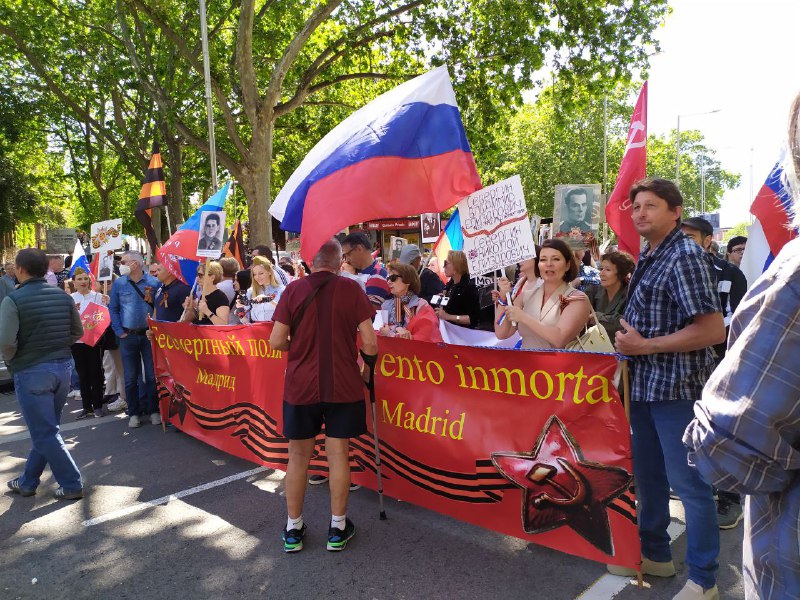
Immortal Regiment in Madrid. Photo credit: BP_ Madrid _Press/Telegram
No pasaran!
This year, the Immortal Regiment marched in Spain for the seventh time. However, it was the time when the organizers encountered unprecedented Russophobia, as well as actual threats and harassment. Members of the Ukrainian diaspora made every effort to prevent the procession of the Immortal Regiment. They sent petitions requesting to ban the event to the King and Queen of Spain, as well as to the head of the Spanish government. Having failed, they sought to obtain permission and hold the rally against the Immortal Regiment in the same location. However, their attempts were not successful. "Thus, the Banderites who have settled in Madrid and Navalny's supporters who have fled Russia are planning to sabotage the anti-fascist march. Hence, the Spanish government has decided to augment the police presence. The organizers have enhanced security measures," wrote Roman Demyan, the organizer of the march, on the Immortal Regiment Madrid Telegram channel before the event started. "Provocateurs are going to join the Immortal Regiment procession with their flags, photos, and chants. They will try to obstruct the speeches and messages in the final part of the event, they will try to make it to the microphone.”
The procession of the Immortal Regiment in Madrid was joined by several hundred people, including Spaniards. Their speeches were a reminder that soldiers of many nationalities had fought together in the Great Patriotic War, and they brought victory over Nazism to the world. The Spanish participants of the Immortal Regiment urged everyone to remember how many soldiers and civilians of the Soviet Union had lost their lives for the sake of defeating fascism.
Those opposing the event occasionally made provocative attempts. One of them even tried to throw eggs at the Immortal Regiment procession, however, that person was immediately struck down to the ground by a policeman. "Ukrainians occasionally try to provoke and shout their slogans. However, the people shout, "No pasarán!", Roman Demyan commented while streaming the event. Nevertheless, everything went well. Summing up, he wrote: "The police managed to prevent severe provocative acts; the Spanish government did not revoke the permit; the organizers were not intimidated and did not cancel the march, and the people came to join despite being constantly threatened. Thanks to all of them for this day!”
"Patriotism is more than just a word now"
Several hundred people came together in the center of Rome to join the Immortal Regiment march. "We did not expect that so many people would come to participate. I am very happy that patriotism is more than just a word for many people now, people really feel what it is like," said Tamara Djuranova, coordinator of the Immortal Regiment in Rome. Daria Pushkova, director of the Russian House in Rome, pointed out that people came together irrespective of nationality, religion, or other differences. "This year we celebrate the 77th anniversary of Victory. There is no one and nothing that can deprive people of this holiday if they feel it to be their own," she emphasized.
Immortal Regiment marched through Rome. Photo credit: Rossotrudnichestvo Italy/Facebook
The event was attended by Italians who brought pictures of Italian and Soviet partisans with them. Commemoration ceremonies dedicated to Victory Day were also held in Milan and other major Italian cities and regions, from Lombardy to Sicily.
Activists in Finland held their first car rally to celebrate Victory Day. The rally provoked public anger from the start. Several thousand people signed a petition demanding the rally be canceled. The event also received the attention of the Finnish Security Intelligence Service, which referred to the rally as the "Russia's information campaign" aimed to influence Finland's decision to join NATO.
Nevertheless, the rally was held. One of the organizers, Daria Skippari-Smirnov, said, "We organized the rally to celebrate Victory Day and to support the Russian Federation in its difficult mission to fight Nazism, fascism, and Russophobia around the world." She also added that the participants supported Donbass and its residents who had been living under war conditions and genocide threats for eight years.
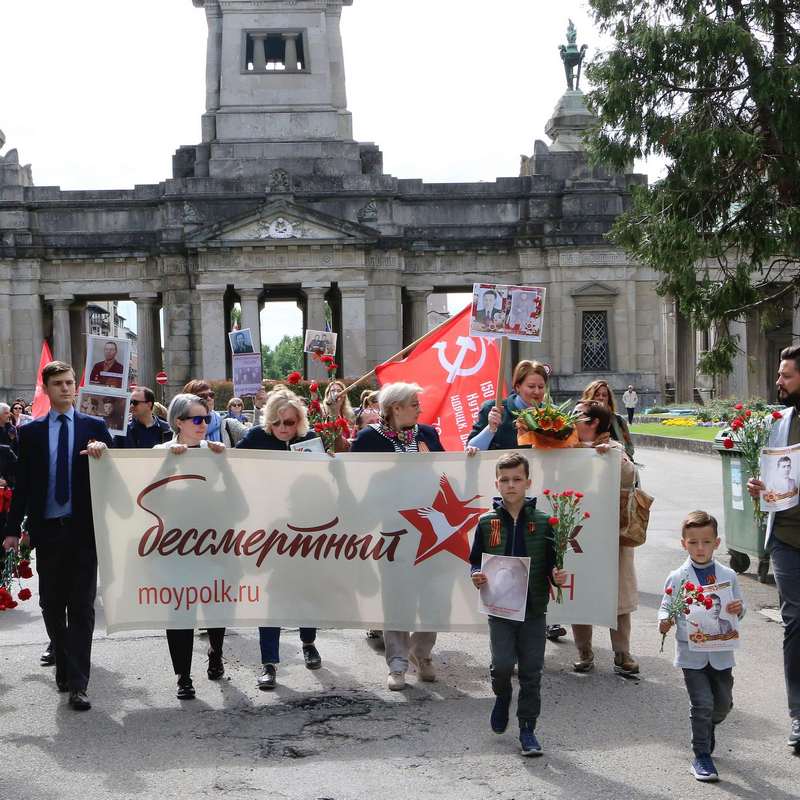
Autorally in Finland. Photo credit: lady_north / Telegram
Fear of the St. George Ribbon
Authorities in the Baltic States also made every effort to hinder Victory Day celebrations. On May 9, police units were augmented in Lithuania. They had to "detect those who display prohibited symbols and subsequently impose fines on them." Arūnas Paulauskas, deputy commissar general of the Lithuanian police, announced the above. He also added that the police had identified "high-risk" targets, which would be under extra attention. It turned out that he referred to military cemeteries that are usually visited by Lithuanian residents during the holidays. According to Mr. Paulauskas, the main objective of the police was to prevent the presence of people with banned symbols.
These days, the St. George Ribbon has become one of the banned symbols in Europe. It is particularly disliked by the authorities of many countries. Other symbols of Russia and the former Soviet Union are also treated unfriendly. Furthermore, this is in the case of the best-case scenario.
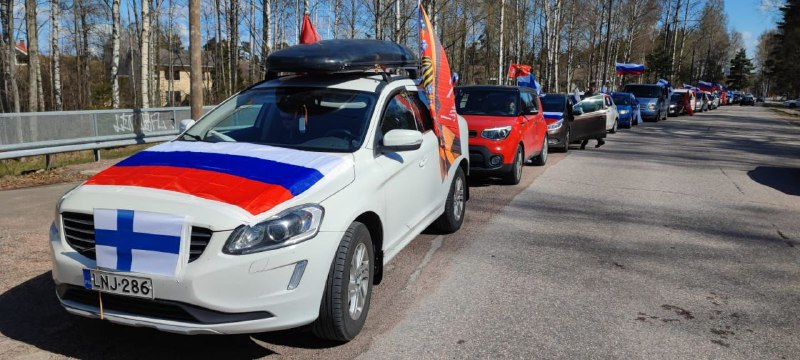
Photo credit: http://russkoepole.de
However, there are some exceptions. "The Ukrainian flag was taken down; the Russian flag was put up. Happy Victory Day! Our Town Hall was one of a few administrations that put up the Russian flag in the past. Under current circumstances, it takes courage to act in this way. Today, any act like that is viewed as support for Russian propaganda and can be punished in accordance with criminal legislation," wrote Sergey Dybov, a resident of Boulogne-sur-Mer, a small town in the north of France, in his Facebook post.
The local authorities in Latvia declared May 9 a "day of mourning" and fenced off the war memorials with a police cordon. However, such measures did not prevent the residents from visiting Monument to the Soviet Warriors Liberators and paying tribute to their memory. Journalist Alla Berezovskaya wrote: "The roads to the monument were closed since early morning. We had to park our cars a couple of kilometers away and go walking. Nevertheless, we had an opportunity to greet everyone with flowers on the way. We bow down before all the soldiers who liberated Riga from the German invaders! We remember, we honor, and we have no doubts! Happy Victory Day!"
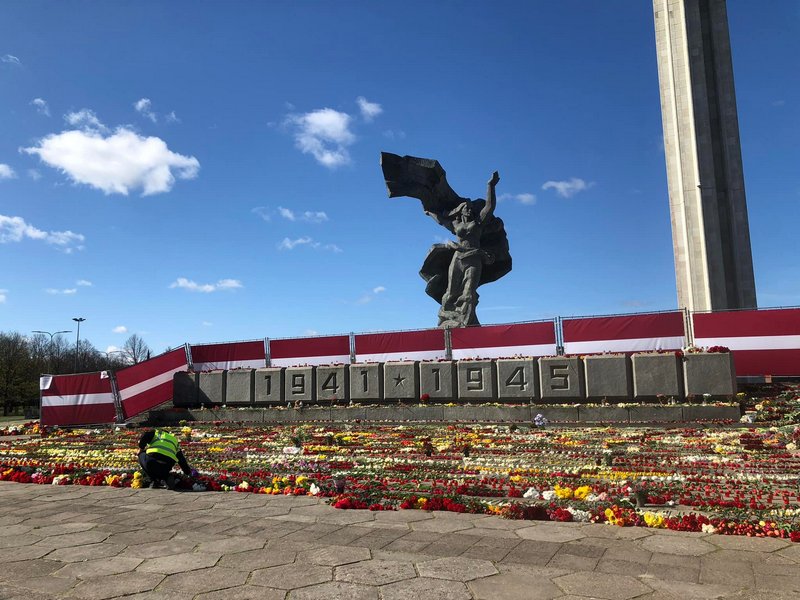
Carpet of flowers at the Monument to the Warriors Liberators in Riga. Photo credit: Alla Berezovskaya / Facebook
"It's our honor"
The Berlin authorities permitted the procession of the Immortal Regiment. However, they requested the participants to avoid using any Russian military symbols, such as the St. George Ribbon, and in particular the letters Z and V, which are currently associated with Russia's special military operation in Ukraine. According to participants, all previous months they had been subjected to the strongest pressure: for example, there were speculations that those who would join the procession with the Victory Banner would be deported from Germany by force.
Nevertheless, people were not intimidated. There were about 1,000 participants with Russian national flags that formed a column at the Brandenburg Gate. "If Nazism is rearing its head, we cannot stay quiet and uninvolved. It is our honor to commemorate our heroes who combated fascism. They cannot deprive us of that," the organizers of the procession declared before the march began. The participants of the march laid flowers at the Soviet War Memorial. The procession of the Immortal regiment had been held in Frankfurt am Main one day earlier. About 1,000 people took part in it.
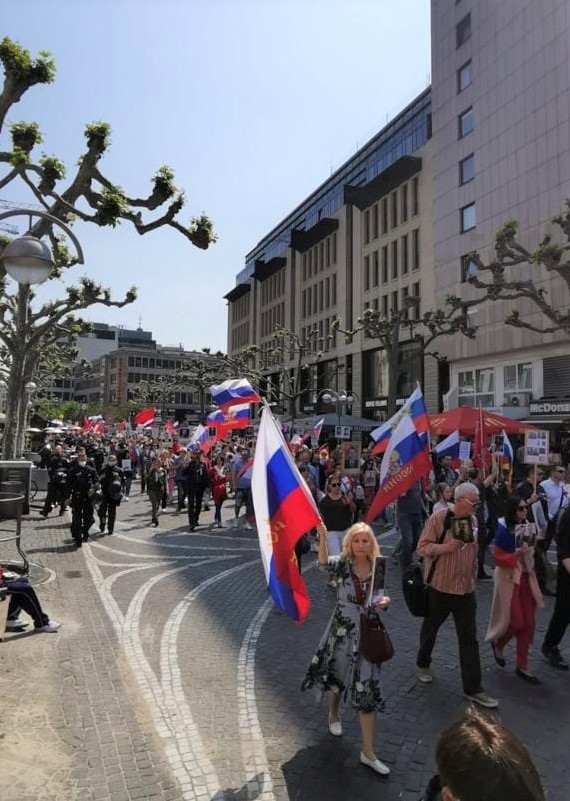
Immortal Regiment in Frankfurt am Main. Photo credit: http://russkoepole.de
The first Immortal Regiment march in liberated Kherson was quite emblematic. Many city residents joined it with Victory Banners and Russian national flags. The Eternal Flame that had been put out by Kiev's authorities in 2014 was lit again on the eve of the holiday.
New publications

 Mikhail Kalatozov, a director who transformed the world of cinematography in many ways, was born 120 years ago. He was a Soviet film official and a propagandist. Above all, he was capable of producing movies that struck viewers with their power and poetic language.
Mikhail Kalatozov, a director who transformed the world of cinematography in many ways, was born 120 years ago. He was a Soviet film official and a propagandist. Above all, he was capable of producing movies that struck viewers with their power and poetic language.  Ukrainian authorities have launched a persecution campaign against the canonical Ukrainian Orthodox Church (UOC), the biggest one in the country's modern history. Over the past year, state sanctions were imposed on clergy representatives, searches were conducted in churches, clergymen were arrested, criminal cases were initiated, the activity of the UOC was banned in various regions of the country, and monasteries and churches were seized.
Ukrainian authorities have launched a persecution campaign against the canonical Ukrainian Orthodox Church (UOC), the biggest one in the country's modern history. Over the past year, state sanctions were imposed on clergy representatives, searches were conducted in churches, clergymen were arrested, criminal cases were initiated, the activity of the UOC was banned in various regions of the country, and monasteries and churches were seized.  When Nektary Kotlyaroff, a fourth-generation Russian Australian and founder of the Russian Orthodox Choir in Sydney, first visited Russia, the first person he spoke to was a cab driver at the airport. Having heard that Nektariy's ancestors left Russia more than 100 years ago, the driver was astonished, "How come you haven't forgotten the Russian language?" Nektary Kotlyaroff repeated his answer in an interview with the Russkiy Mir. His affinity to the Orthodox Church (many of his ancestors and relatives were priests) and the traditions of a large Russian family brought from Russia helped him to preserve the Russian language.
When Nektary Kotlyaroff, a fourth-generation Russian Australian and founder of the Russian Orthodox Choir in Sydney, first visited Russia, the first person he spoke to was a cab driver at the airport. Having heard that Nektariy's ancestors left Russia more than 100 years ago, the driver was astonished, "How come you haven't forgotten the Russian language?" Nektary Kotlyaroff repeated his answer in an interview with the Russkiy Mir. His affinity to the Orthodox Church (many of his ancestors and relatives were priests) and the traditions of a large Russian family brought from Russia helped him to preserve the Russian language.

 The leaders of the Friends of the Great Russia cultural association (Amici Della Grande Russia) in Italy believe that the Western policy of abolishing Russian culture in Europe has finally failed. Furthermore, it was doomed to failure from the beginning.
The leaders of the Friends of the Great Russia cultural association (Amici Della Grande Russia) in Italy believe that the Western policy of abolishing Russian culture in Europe has finally failed. Furthermore, it was doomed to failure from the beginning.  Name of Vladimir Nemirovich-Danchenko is inscribed in the history of Russian theater along with Konstantin Stanislavski, the other founding father of the Moscow Art Theater. Nevertheless, Mr. Nemirovich-Danchenko was a renowned writer, playwright, and theater teacher even before their famous meeting in the Slavic Bazaar restaurant. Furthermore, it was Mr. Nemirovich-Danchenko who came up with the idea of establishing a new "people's" theater believing that the theater could become a "department of public education."
Name of Vladimir Nemirovich-Danchenko is inscribed in the history of Russian theater along with Konstantin Stanislavski, the other founding father of the Moscow Art Theater. Nevertheless, Mr. Nemirovich-Danchenko was a renowned writer, playwright, and theater teacher even before their famous meeting in the Slavic Bazaar restaurant. Furthermore, it was Mr. Nemirovich-Danchenko who came up with the idea of establishing a new "people's" theater believing that the theater could become a "department of public education."  "Russia is a thing of which the intellect cannot conceive..." by Fyodor Tyutchev are famous among Russians at least. December marks the 220th anniversary of the poet's birth. Yet, he never considered poetry to be his life's mission and was preoccupied with matters of a global scale. Mr.Tyutchev fought his war focusing on relations between Russia and the West, the origins of mutual misunderstanding, and the origins of Russophobia. When you read his works today, it feels as though he saw things coming in a crystal ball...
"Russia is a thing of which the intellect cannot conceive..." by Fyodor Tyutchev are famous among Russians at least. December marks the 220th anniversary of the poet's birth. Yet, he never considered poetry to be his life's mission and was preoccupied with matters of a global scale. Mr.Tyutchev fought his war focusing on relations between Russia and the West, the origins of mutual misunderstanding, and the origins of Russophobia. When you read his works today, it feels as though he saw things coming in a crystal ball...